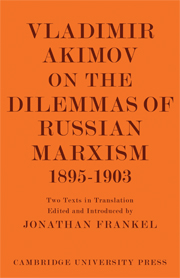 Vladimir Akimov on the Dilemmas of Russian Marxism 1895–1903
Vladimir Akimov on the Dilemmas of Russian Marxism 1895–1903 Published online by Cambridge University Press: 04 August 2010
The development of exchange has established such close links between all the peoples of the civilized world that the great liberation movement of the proletariat could not but become, and has in fact long since become, international.
As it considers its Party to be a unit of the world army of the proletariat, the Russian Social Democratic movement has pursued the same ultimate goal as the Social Democrats of all other countries.
This ultimate goal is determined by the character of bourgeois society and by the course of its development. The chief characteristic of this society is commodity production on the basis of capitalist productive relations. The most important and significant part of the means of production and of commodity distribution belongs to a class that is numerically small. Yet the vast majority of the population consists of proletarians and semi-proletarians, compelled by their economic position continually or periodically to sell their labour power, i.e., to hire themselves out to the capitalists, and by their labour to create the income of the upper classes of society.
The area dominated by capitalist productive relations constantly increases as steady technological advance gives greater economic weight to large enterprises and makes for the elimination of small independent producers, transforming some into proletarians, and narrowing the socio-economic functions of the others, who, in certain areas, are forced into more or less complete, more or less open, more or less oppressive dependence on capital.
This technological progress also enables the employers to use the labour of women and children on an ever-mounting scale in the production and distribution of commodities.
To save this book to your Kindle, first ensure [email protected] is added to your Approved Personal Document E-mail List under your Personal Document Settings on the Manage Your Content and Devices page of your Amazon account. Then enter the ‘name’ part of your Kindle email address below. Find out more about saving to your Kindle.
Note you can select to save to either the @free.kindle.com or @kindle.com variations. ‘@free.kindle.com’ emails are free but can only be saved to your device when it is connected to wi-fi. ‘@kindle.com’ emails can be delivered even when you are not connected to wi-fi, but note that service fees apply.
Find out more about the Kindle Personal Document Service.
To save content items to your account, please confirm that you agree to abide by our usage policies. If this is the first time you use this feature, you will be asked to authorise Cambridge Core to connect with your account. Find out more about saving content to Dropbox.
To save content items to your account, please confirm that you agree to abide by our usage policies. If this is the first time you use this feature, you will be asked to authorise Cambridge Core to connect with your account. Find out more about saving content to Google Drive.